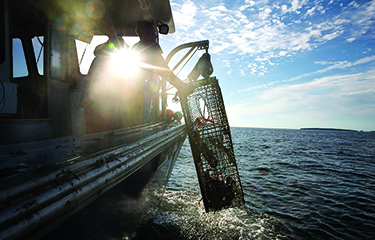US judge rejects Maine lobstermen’s appeal of new rules

A U.S. federal judge turned down a bid from the lobster industry in the U.S. state of Maine to delay new restrictions aimed at protecting endangered north Atlantic right whales, rejecting fishermen’s arguments that the National Marine Fisheries Service acted arbitrarily and overstated the hazard their gear poses to whales.
U.S. District Court Judge James E. Boasberg in Washington, D.C., ruled Thursday, 8 September against lobstermen’s groups and the state of Maine in their action against NMFS and allied environmental groups supporting new lobster gear and area restrictions.
“NMFS reasonably explained how it estimated the right whale population and modeled that population into the future, drawing on what it rationally assessed was the best available data and submitting its methods for peer review. That is all that the Administrative Procedure Act requires,” Boasberg wrote in his 33-page opinion.
Boasberg previously ruled that federal protections for whales did not go far enough under the Marine Mammal Protection Act and Endangered Species Act. NMFS said its latest set of rules and restrictions will offer more protection to the highly endangered population, now estimated to be only around 340 animals in the Atlantic waters of the U.S. and Canada.
Among their arguments, Maine lobstermen contended the danger posed by their gear if far overstated. There has not been a documented case of whale entanglement with Maine lobster gear in 18 years, according to Patrice McCarron, executive director of the Maine Lobstermen’s Association.
The Maine Lobstermen’s Association said in a statement its members see the new rules as an immense threat to their industry’s survival.
“The federal district court and the National Marine Fisheries Service have failed Maine’s lobster industry. It has become crystal clear that neither grasp the devastating impacts their decisions will have on the Maine lobster industry, our coastal communities, and the state of Maine,” it said. “The court’s decision provides a blank check for NMFS to continue to use admitted ‘worst-case scenarios’ and disregard actual data in its regulation of a fishery that has zero documented right whale entanglements over the last 18 years. This disappointing decision puts the future of Maine’s lobstering heritage at great risk, and along with it, the livelihoods of thousands of hard-working men and women. But this is not the end. We won’t go down without a fight.”
The MLA, Maine Lobstering Union Local 207, and the State of Maine challenged the rules and the data behind them in the last biological opinion developed by NMFS. Siding with the agency as defendants were the Conservation Law Foundation, Center for Biological Diversity, and Defenders of Wildlife.
“This decision rejects the lobster industry’s attempts to distract from the overwhelming scientific evidence that entanglements have killed far too many right whales for far too long,” said Erica Fuller, a senior attorney at the Conservation Law Foundation. “It took the fisheries service five years to finalize a rule that only reduced lethal entanglement risk by 50 percent when the science shows 90 percent is needed. This species doesn’t have another five years to wait for the agency to comply with the law.”
The environmental groups themselves prevailed two months ago in a legal challenge to NMFS and the biological opinion, arguing before Boasbergthe agency’s protection measures are not going far enough. That could bring about even more restrictions.
But Boasberg ruled that NMFS had made a reasonable effort to estimate dangers of future gear entanglements.
“While noting that heavier Canadian gear used for fishing snow crabs is more lethal than American buoy lines used for lobstering, NMFS nonetheless concluded that the large number of buoy lines in U.S. waters, combined with substantial uncertainty on the effects of the countries’ mitigation measures, suggested a 50-50 split,” the judge wrote. “For good measure, the agency submitted its approach for peer review by the Center for Independent Experts, which concluded that given the limited data available, NMFS’s approach was ‘reasonable’….This analysis was not arbitrary and capricious.”
Maine state officials have been siding with fishing advocates in court, and Maine Governor Janet Mills said that support will continue.
“The National Marine Fisheries Service has consistently interpreted the data in the most-conservative way possible, without accounting for the impact of ship strikes on whales and whale entanglements in Canadian snow crab gear, putting all of the burden for right whale protection squarely on the shoulders of Maine’s lobster fishery,” Mills said in a statement. “Maine lobstermen care about the endangered right whale and have undertaken substantial actions to protect them at great personal expense; but the federal government’s regulations are simply not based in sound science or proven fact.”
Boasberg acknowledged the heavy toll the ruling will take on Maine's lobster industry and its workers, but said he felt compelled to defer to the U.S. government agency in deciding the best means and methods for regulating the fishing industry.
“At the end of the day, NMFS here considered the relevant data and offered a rational and peer-reviewed explanation for its approach,” Boasberg wrote. “As attempting to trace the location of mortal entanglements is quintessentially murky water, the court declines to displace the expert agency’s judgment," he wrote. "The court remains cognizant of the weighty interests of all parties to this dispute: the lobstermen in preserving their livelihood and traditions; the conservation groups in protecting the near-extinct right whale; and NMFS in making complex predictions with imperfect data."
Photo courtesy of the Maine Lobster Marketing Collaborative






Share